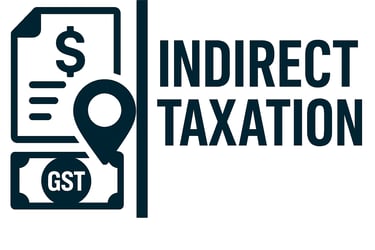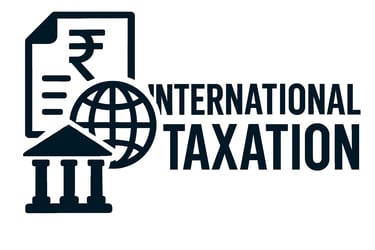“ Through the tax code, we decide what activities to encourage or discourage.
That’s why tax planning is not just legal—it’s essential ”
Tax & Legal








Every business decision carries tax implications that can significantly impact profitability and long-term growth. With tax and regulatory frameworks—both in India and globally—undergoing rapid transformation, navigating this evolving landscape requires expert insight at every stage, from planning through compliance.
We focus on quality, reliability, and real-time responsiveness to meet the diverse and dynamic needs of our clients. Our approach ensures high partner and management involvement, enabling swift decision-making and delivering value through a deep understanding of client objectives.
With shorter communication chains, more senior-level engagement, and empowered client service teams, we offer agile, strategic, and integrated solutions that match the pace of modern businesses.
Our Tax and Regulatory Services Include:
Direct Tax Services : Advisory, planning, and compliance support in line with domestic tax regulations
Indirect Tax Services: GST advisory, compliance, audits, and representation
Transfer Pricing: Planning, documentation, and dispute resolution, aligned with global standards
Financial Services: Specialized tax and regulatory advice for financial institutions and intermediaries
Transaction Tax: Structuring, due diligence, and tax planning support for mergers, acquisitions, and restructuring
Expatriate Taxation: End-to-end solutions for global mobility, including tax planning, compliance, and payroll support for expatriates
Direct Tax
In today’s complex tax environment, businesses require more than just compliance—they need insight, strategy, and foresight. Our team of seasoned tax professionals provides a comprehensive suite of direct tax advisory, litigation, regulatory, and compliance services to help clients make informed decisions and manage risk efficiently.
Integrated Tax and Regulatory Expertise
We offer a broad range of fully integrated tax and regulatory services, combining technical expertise with commercial understanding. As India becomes an increasingly attractive investment destination, our specialists support businesses at every stage of their lifecycle—helping them seize opportunities, remain compliant, and minimize risk.
We also assist clients in managing cross-border tax matters by providing structured advice on complex international transactions, helping them optimize returns while staying ahead of global tax developments.
Who We Serve
Our tax solutions are tailored for:
Large multinational corporations
Mid-sized enterprises
High-net-worth individuals
Entrepreneurs seeking strategic growth
Our goal is to minimize both business and personal tax exposure through legitimate planning and ongoing awareness of evolving tax regulations in India and abroad.
Service Categories
1.Corporate Tax Services
We help clients navigate increasingly complex tax legislation through proactive planning and compliance strategies.
Key Offerings:
Corporate tax advisory and planning
Statutory compliance support
Tax diagnostic reviews and risk mitigation
Tax withholding health checks
Tax minimization strategies and deduction planning
Capital structure and debt-equity ratio optimization
Tax implications on EPC/turnkey contracts
Review of ICDS, Ind-AS, POEM, GAAR applicability
FIN-48 compliance support
2. Tax Compliance
End-to-end assistance in meeting tax compliance requirements.
Our services include:
Withholding tax returns preparation and filing
Advance tax planning and optimization
Corporate tax return preparation and filing
Tax return filing for overseas entities operating in India
3. International Tax Services
Our aim is to help businesses optimize their global tax footprint while ensuring full compliance across jurisdictions.
Key Areas of Expertise:
Outbound investment advisory and due diligence
Treaty analysis and international tax planning
BEPS & Multilateral Instrument (MLI) advisory
Equalisation levy and digital payments taxation
Non-resident taxation (e.g., shipping companies)
Investment treaty interpretation
Mutual Agreement Procedure (MAP) assistance
Advance Ruling application support
4. Tax Representation & Litigation Services
We offer strategic representation and litigation support to handle audits, assessments, and disputes at all stages.
Our Litigation Services Include:
Representation before tax authorities during audits and investigations
Litigation before CIT(A), DRP, ITAT
Support to legal counsel for High Court/Supreme Court representation
Advisory on litigation strategy and execution
Litigation history reviews and risk analysis
Evaluation of uncertain tax positions and remediation support


In the dynamic landscape of indirect taxation, particularly under the Goods and Services Tax (GST) and Customs law, businesses must remain proactive, compliant, and strategically aligned. Our experienced team provides end-to-end support across advisory, compliance, litigation, and strategic review to help you manage your tax exposure and meet evolving regulatory demands.
Advisory Services
We help clients assess and plan for the tax impact of their business operations and transactions. Our advisory offerings include:
Evaluation of tax implications on existing and proposed business transactions
Contract and agreement review to identify GST impact across procurement, manufacturing, and distribution
Assistance in determining optimal valuation models for related-party transactions under GST, aligned with transfer pricing principles
Review and validation of legal positions adopted under GST, with suggestions for optimization
Guidance on compliance with anti-profiteering rules under GST
Advisory on import/export of goods under the Customs Act, 1962
Assistance with Customs valuation in related-party import transactions
Advice on duty-free incentive schemes under the Foreign Trade Policy
Compliance Services
Staying compliant with GST and related legislation is crucial for risk mitigation and operational continuity. Our compliance services include:
Assistance in obtaining GST and other statutory registrations
Verification of input tax credit (ITC) and identification of ineligible credits
Review of periodic tax liability computations
Preparation and filing of GST returns and other periodic filings
Implementation of GSP/ASP solutions for seamless compliance management
Filing of statutory applications before relevant authorities
Litigation Support
We offer strategic and responsive support in handling indirect tax disputes, inquiries, and clarifications:
Drafting responses to notices, inquiries, and communications from tax authorities
Assistance with filing appeals against appellate orders
Representation before GST and Customs authorities, including coordination with external counsel where needed
Filing of advance ruling applications for clarity on ambiguous issues
Other Services
We support your tax function with strategic reviews, training, and audit preparedness:
Due diligence reviews from an indirect tax perspective (for M&A, investment, or internal controls)
Health-check reviews to assess the adequacy of compliance systems
Representation and technical assistance during departmental audits
Support in preparing and filing representations before Advance Ruling or other tax authorities
Training for management and staff on key GST provisions and updates
Indirect Tax


In India, international taxation refers to the rules and regulations governing cross-border transactions, including income earned by foreign entities in India and by Indian residents from abroad. Here are the main types of international taxation applicable in India:
🔹 1. Based on Taxation Principles
A. Residence-Based Taxation
Indian residents are taxed on their global income.
Applies to:
Individuals who qualify as Residents and Ordinarily Residents (ROR).
Indian companies and firms.
B. Source-Based Taxation
Non-residents and foreign companies are taxed on income sourced in India.
Common examples:
Income from business operations in India.
Royalties or fees for technical services received from Indian entities.
Capital gains from assets located in India.
🔹 2. Taxation of Different Categories of Income
A. Business Income
Taxed in India if the non-resident has a business connection or a permanent establishment (PE) in India.
Governed by Section 9 of the Income Tax Act and applicable tax treaties.
B. Royalty and Fees for Technical Services (FTS)
Taxable if:
Paid by an Indian resident, or
The services are used in India.
Subject to withholding tax (usually 10–15%, depending on the treaty).
C. Capital Gains
Gains from transfer of shares, property, or assets located in India are taxable in India, even for non-residents.
Tax rate depends on whether gains are short-term or long-term.
D. Interest Income
Taxed if paid by a resident or relates to a debt used in India.
Subject to withholding tax (e.g., 5% under Section 194LC for ECBs).
🔹 3. Key Mechanisms & Provisions in Indian International Taxation
A. Withholding Tax (TDS for Non-Residents)
Indian payers must deduct tax at source when paying to non-residents for:
Royalty
Interest
Technical services
Dividends (in some cases)
B. Double Taxation Avoidance Agreements (DTAAs)
India has DTAAs with over 90 countries.
These treaties:
Avoid double taxation,
Provide lower tax rates (like 5%, 10%),
Define permanent establishment (PE) rules.
C. Transfer Pricing Regulations
Apply to international transactions between associated enterprises.
Requires pricing to be at arm’s length.
Mandatory documentation and reporting under Income Tax Act.
D. Equalisation Levy / Digital Tax
Tax on digital services provided by foreign companies to Indian users.
Currently:
6% on online advertising revenue (Section 165),
2% on e-commerce supplies/services by non-residents (Section 165A).
E. General Anti-Avoidance Rules (GAAR)
Prevents tax avoidance through aggressive planning.
Applies to arrangements lacking commercial substance.
F. Controlled Foreign Corporation (CFC) Rules
India does not currently have formal CFC rules, but GAAR and POEM (Place of Effective Management) rules serve similar purposes.
🔹 4. Double Taxation Relief in India
A. Unilateral Relief (Section 91)
Given if there’s no DTAA, but foreign income is taxed in both countries.
B. Bilateral Relief (Section 90)
Given when there is a DTAA. Relief can be by:
Exemption Method
Credit Method
Summary Table
Tax Aspect Applies To Relevant Provision
Global Income Residents (ROR) Section 5
Indian Source IncomeNon-residents, Foreign Cos Section 9
Transfer Pricing Associated Enterprises Section 92-92F
Equalisation Levy Non-resident digital companies Section 165/165A
Withholding Tax Payments to non-residents Section 195DTAA
Benefits Residents & Non-residents Section 90/90A
Unilateral Relief No DTAA but foreign tax paid Section 91
International Taxation


Expatriate Tax in India refers to the income tax rules and obligations that apply to foreign nationals (expats) working or staying in India. The tax treatment depends mainly on the residency status, type of income, and duration of stay in India.
📌 1. Residential Status – Key to Taxability
Under the Income Tax Act, 1961, an individual's tax liability depends on whether they are:
StatusCriteriaResident & Ordinarily Resident (ROR)Stayed ≥ 182 days in India during the financial year (April–March), or met other cumulative criteria.Resident but Not Ordinarily Resident (RNOR)Resident in India but hasn't been a resident in 2 out of the past 10 years, or stayed ≤ 729 days in past 7 years.Non-Resident (NR)Did not meet the 182-day or other residency conditions.
🔹 Tax Implication by Residency:
Type of IncomeRORRNORNRIndia-sourced incomeTaxedTaxedTaxedForeign incomeTaxedNot Taxed (mostly)Not Taxed
📌 2. Types of Income Taxed for Expats in India
If you're an expat working in India, you may be taxed on:
Salary income (including perquisites like housing, car, etc.)
Allowances (HRA, travel, education, etc.)
Bonus/Commission
Stock options (ESOPs)
Reimbursements
Other income like interest from Indian banks, capital gains on Indian assets
⚠️ Even if the salary is paid outside India, it is taxed if services are rendered in India.
📌 3. Tax Rates
Expats are taxed as per individual slab rates, same as Indian citizens:
Income Slab (FY 2025–26)Tax RateUp to ₹2.5 lakhNil₹2.5 – ₹5 lakh5%₹5 – ₹10 lakh20%Above ₹10 lakh30%
🔹 Surcharge and cess may apply for high earners.
📌 4. Double Taxation Avoidance Agreement (DTAA)
India has DTAA with over 90 countries (e.g., USA, UK, Germany, Australia). Benefits:
Avoid double taxation on the same income
Claim foreign tax credit for taxes paid abroad
Choose between exemption method or credit method
📌 5. Social Security – Totalization Agreements
India has Social Security Agreements (SSA) with several countries. This helps:
Avoid dual social security contributions
Protect pension rights
Applicable countries include Germany, Belgium, South Korea, France, etc.
📌 6. Compliance Requirements for Expats
PAN (Permanent Account Number): Mandatory for filing taxes
Income Tax Return (ITR): File by July 31 (non-audit cases)
Form 67: For claiming foreign tax credit
Form 10F and Tax Residency Certificate (TRC): Needed for DTAA benefits
✅ Summary
Aspect Details
Residency-based Tax Yes – India taxes based on stay duration and source of income
Global Income taxed? Only if ROR
DTAA Available to avoid double taxation
Tax filing Mandatory if income > basic exemption
PAN Needed
Expatriate Taxation
Taxation litigation in India spans across various laws and authorities, involving both direct and indirect taxes. Here’s a breakdown of the major types of taxation litigations in India:
🔹 1. Direct Tax Litigations
These primarily involve Income Tax and are governed by the Income Tax Act, 1961.
Common types:
Assessment Disputes
Challenges to the tax amount assessed by the Income Tax Department.Transfer Pricing Disputes
Issues involving pricing of international transactions between associated enterprises.Reassessment Proceedings (Section 147/148)
Litigation over reopening of past assessments by the department.Search and Seizure Cases (Section 132)
Disputes arising from raids and searches, especially regarding undisclosed income.Penalty Proceedings
Cases contesting penalties for concealment or misreporting of income.TDS/TCS Issues
Disputes on non-deduction, short deduction, or non-deposit of Tax Deducted at Source.Capital Gains Disputes
Issues related to calculation, exemption, or classification of capital gains.
🔹 2. Indirect Tax Litigations
Indirect tax litigation involves taxes such as GST, Customs, and Excise.
A. Goods and Services Tax (GST) Disputes
Governing Law: Central Goods and Services Tax Act, 2017 and related state GST laws.
Wrong Classification of Goods/Services
Input Tax Credit (ITC) Disputes
Anti-Profiteering Cases
Mismatch in GSTR Filings
E-way Bill and Detention Seizure Issues
Transitional Credit Issues (from VAT/Service Tax to GST)
B. Customs Litigation
Governing Law: Customs Act, 1962
Classification and Valuation Disputes
Import/Export Restrictions
Duty Drawback Disputes
Evasion and Smuggling Allegations
Misuse of Free Trade Agreements
C. Central Excise and Service Tax (Pre-GST Regime)
Though subsumed under GST, legacy disputes still exist.
CENVAT Credit Disputes
Classification of Goods/Services
Show Cause Notices for Tax Evasion
🔹 3. Constitutional Litigation Related to Taxation
These are typically heard in High Courts and the Supreme Court under writ jurisdiction (Article 226/32).
Challenge to Validity of Tax Laws
Discrimination or Violation of Fundamental Rights by Tax Provisions
Inter-State Tax Disputes
🔹 4. International Taxation Disputes
Involving cross-border transactions.
Double Taxation Avoidance Agreements (DTAA) Interpretations
Permanent Establishment Issues
Equalisation Levy Disputes
BEPS (Base Erosion and Profit Shifting) Concerns
🔹 5. Advance Rulings and Advance Pricing Agreements
Authority for Advance Rulings (AAR): For clarity on tax liability of a transaction.
Disputes from APA Interpretations in transfer pricing.
🔹 6. Appellate Proceedings and Forums
CIT(A): Commissioner of Income Tax (Appeals)
ITAT: Income Tax Appellate Tribunal
CESTAT: Customs, Excise, and Service Tax Appellate Tribunal
GSTAT: Goods and Services Tax Appellate Tribunal (being operationalised)
High Courts and Supreme Court: On substantial questions of law
Tax based Litigation


